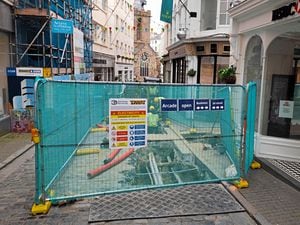'Carry on learning, even if you leave school after GCSE'
SUCCESSFUL 16-year-olds should not give up on learning now they have passed their GCSEs.

SUCCESSFUL 16-year-olds should not give up on learning now they have passed their GCSEs.
Extra qualifications will stand them in better stead in the world of work, according to those in industry.
With excellent GCSE results achieved across the island this week, many employers said that there were benefits from taking people on at this level.
However, further training or additional qualifications put young people in an even better position.
HR manager Hermione Surcombe said Guernsey Electricity took on apprentices post GCSE, but only around three per year.
'Generally, if they can stay on at school that's going to be a benefit to them. If we take them on after they've studied A-levels we will take them on as engineers and give them higher level qualifications, such as an HNC or a degree.'
Guernsey Electricity apprentices must have a minimum of five GCSES at grade C and above, including maths.
'The benefit is we get to train them in the way we like to train them,' Mrs Surcombe said.
'They get a lot of experience by the time they've done their five-year apprenticeship. They are able to do the job we want them to do.'
Julia Le Tissier, from Prime Recruitment, agreed employers were happy to take school leavers at GCSE level, but said that candidates must show skills in other areas.
'Employers are happy to take on students after GCSEs who show enthusiasm and determination at interview and a willingness to learn more about their desired field,' she said.
'School leavers are more informed about the career options open to them than ever before and this leads to many school leavers knowing exactly what they require in a job.'
She said that students seeking employment were likely to want to undertake vocational study and start a career.
A spokesman for Commerce and Employment said: 'Our workforce development programme places great emphasis on on-going personal and skills development.
'As a minimum, employers want staff who have quality transferable skills and a good attitude to work.
'The A-level and GCSE achievements of local students is a strong indication that they have these qualities. The recent results bode well for Guernsey's future workforce and, as well, for employers.'
The island's out-performance of the UK should be a comfort for local employers, according to Alun Williams, head of lifelong learning.
'It just confirms that we are creating a workforce that will be more than capable of facing the challenges of an increasingly competitive global economy,' he said.
'Employers should be particularly pleased that our youngsters are doing so well because today's qualifications are intended to help young people acquire the skills needed in the workplace.
You only succeed at A-level or GCSE if you can, for example, communicate, work to deadlines and assimilate and apply information and knowledge.'
Mr Williams added that exams were only one of the indicators of accomplishment of young people.
Deputy Education minister Allister Langlois was delighted with this year's pass rate.
'Some young people will always want to go straight into employment and the excellent results we got with GCSEs gave them the opportunity, more so than most of their colleagues in the UK.
'We hope that if they do that, they will continue with their part-time education and employers will support them to go to a higher level,' he said.
'Qualifications will be a benefit to employers and young people.'





